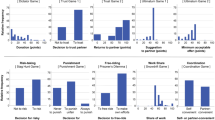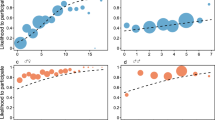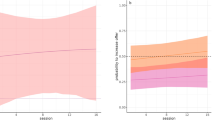Abstract
Humans are an unusually prosocial species—we vote, give blood, recycle, give tithes and punish violators of social norms. Experimental evidence indicates that people willingly incur costs to help strangers in anonymous one-shot interactions1,2, and that altruistic behaviour is motivated, at least in part, by empathy and concern for the welfare of others (hereafter referred to as other-regarding preferences)1,2,3. In contrast, cooperative behaviour in non-human primates is mainly limited to kin and reciprocating partners, and is virtually never extended to unfamiliar individuals4. Here we present experimental tests of the existence of other-regarding preferences in non-human primates, and show that chimpanzees (Pan troglodytes) do not take advantage of opportunities to deliver benefits to familiar individuals at no material cost to themselves, suggesting that chimpanzee behaviour is not motivated by other-regarding preferences. Chimpanzees are among the primates most likely to demonstrate prosocial behaviours. They participate in a variety of collective activities, including territorial patrols, coalitionary aggression, cooperative hunting, food sharing and joint mate guarding5,6,7,8,9,10,11,12. Consolation of victims of aggression13 and anecdotal accounts of solicitous treatment of injured individuals suggest that chimpanzees may feel empathy14,15. Chimpanzees sometimes reject exchanges in which they receive less valuable rewards than others, which may be one element of a ‘sense of fairness’, but there is no evidence that they are averse to interactions in which they benefit more than others16,17,18.
This is a preview of subscription content, access via your institution
Access options
Subscribe to this journal
Receive 51 print issues and online access
$199.00 per year
only $3.90 per issue
Buy this article
- Purchase on SpringerLink
- Instant access to full article PDF
Prices may be subject to local taxes which are calculated during checkout


Similar content being viewed by others
References
Fehr, E. & Fischbacher, U. The nature of human altruism. Nature 425, 785–791 (2003)
Henrich, J. et al. (eds) Foundations of Human Sociality (Oxford Univ. Press, Oxford, 2004)
Penner, L. A., Dovidio, J. F., Piliavin, J. A. & Schroeder, D. A. Prosocial behaviour: multilevel perspectives. Annu. Rev. Psychol. 56, 365–392 (2005)
Silk, J. B. in Moral Sentiments and Material Interests: On the Foundations of Cooperation in Economic Life (eds Gintis, H., Bowles, S., Boyd, R. & Fehr, E.) 43–74 (MIT Press, Cambridge, 2005)
Mitani, J. & Watts, D. P. Why do chimpanzees hunt and share meat? Anim. Behav. 61, 915–924 (2001)
Mitani, J., Merriwether, D. A. & Zhang, C. Male affiliation, cooperation, and kinship in wild chimpanzees. Anim. Behav. 59, 885–893 (2000)
Watts, D. P. Coalitionary mate guarding by male chimpanzees at Ngogo, Kibale National Park, Uganda. Behav. Ecol. Sociobiol. 44, 43–55 (1998)
Watts, D. P. Reciprocity and interchange in the social relationships of wild male chimpanzees. Behaviour 139, 343–370 (2002)
Watts, D. P. & Mitani, J. Boundary patrols and intergroup encounters in wild chimpanzees. Behaviour 138, 299–327 (2001)
Goodall, J. The Chimpanzees of Gombe (Harvard Univ. Press, Cambridge, 1986)
Boesch, C. & Boesch-Achermann, H. The Chimpanzees of the Taï Forest (Oxford Univ. Press, Oxford, 2002)
Hohmann, G., Gerloff, U., Tautz, D. & Fruth, B. Social bonds and genetic ties: kinship, association, and affiliation in a community of bonobos (Pan paniscus). Behaviour 136, 1219–1235 (1999)
de Waal, F. B. M. & Aureli, F. in Reaching into Thought (eds Russon, A. E., Bard, K. A. & Parker, S. T.) 80–110 (Cambridge Univ. Press, Cambridge, 1996)
Flack, J. C. & de Waal, F. B. M. ‘Any animal whatever’: Darwinian building blocks of morality in monkeys and apes. J. Consciousness Stud. 7, 1–29 (2000)
Preston, S. D. & de Waal, F. B. M. Empathy: its ultimate and proximate bases. Behav. Brain Sci. 25, 1–72 (2002)
Brosnan, S. F. & de Waal, F. B. M. Monkeys reject unequal pay. Nature 425, 297–299 (2003)
Brosnan, S. F., Schiff, H. C. & de Waal, F. B. M. Tolerance for inequity may increase with social closeness in chimpanzees. Proc. R. Soc. Lond. B 272, 253–258 (2005)
Henrich, J. Inequity aversion in capuchins? Nature 428, 139 (2004)
Povinelli, D. J. in Developing Thories of Intention: Social Understanding and Self-Control (eds Zelazo, P., Astington, J. & Olson, D.) 195–225 (L. Erlbaum, Hillsdale, 1999)
Povinelli, D. J. Folk Physics for Apes (Oxford Univ. Press, Oxford, 2003)
Crawford, M. The cooperative solving of problems by young chimpanzees. Comp. Psych. Monogr. 14, 1–88 (1937)
Hauser, M. D., Chen, M. K., Chen, F. & Chuang, E. Give unto others: genetically unrelated cotton-top tamarin monkeys preferentially give food to those who altruistically give food back. Proc. R. Soc. Lond. B 270, 2363–2370 (2003)
De Waal, F. B. M. & Berger, M. Payment for labour in monkeys. Nature 404, 563 (2000)
Cronin, K. A., Kurian, A. V. & Snowdon, C. T. Cooperative problem solving in a cooperatively breeding primate (Saguinus oedipus). Anim. Behav. 69, 133–142 (2005)
Richerson, P. J. & Boyd, R. Not by Genes Alone: How Culture Transformed Human Evolution (Univ. Chicago Press, Chicago, 2004)
Boyd, R., Gintis, H., Bowles, S. & Richerson, P. J. The evolution of altruistic punishment. Proc. Natl Acad. Sci. USA 100, 3531–3535 (2003)
Greene, J. & Haidt, J. How (and where) does moral judgement work? Trends Cog. Sci. 16, 517–523 (2002)
Povinelli, D. P. & Godfrey, L. R. in Evolutionary Ethics (eds Nitecki, M. H. & Nitecki, D. V.) 277–324 (SUNY, Albany, 1993)
Clutton-Brock, T. H. Behavioral ecology—breeding together: kin selection and mutualism in cooperative vertebrates. Science 296, 69–72 (2002)
Acknowledgements
This work was supported by a grant from the MacArthur Foundation Preferences Network to J.B.S., J.H. and D.J.P., and a grant from the James S. McDonnell Foundation to D.J.P. A James S. McDonnell Foundation Centennial Fellowship was awarded to D.J.P. S.F.B. was supported by an NIH/NIGMS IRACDA grant awarded to Emory University. The Texas colony was supported by NIH/NCRR. We are grateful to R. McElreath for advice about statistical procedures. Author Contributions The original idea for the experiments was conceived by J.B.S. The experimental protocol used in Louisiana was developed by D.J.P., J.V. and J.B.S. J.V. supervised experiments, coding and data tabulation in Louisiana. The experimental protocol used in Texas was developed by S.F.B., J.H., J.V., D.J.P. and J.B.S. S.F.B. supervised experiments, coding and data tabulation in Texas; A.S.R. and J.M. assisted in data collection in Texas. S.P.L. and S.J.S. provided essential support for research at the Texas colony. J.H. conducted the statistical analyses. J.B.S. drafted the manuscript.
Author information
Authors and Affiliations
Corresponding author
Ethics declarations
Competing interests
Reprints and permissions information is available at npg.nature.com/reprintsandpermissions. The authors declare no competing financial interests.
Supplementary information
Supplementary Methods
This file provides a complete description of the experimental protocols used at the two study sites, complete results from multivariate logistical regression analyses presented in the main text and additional statistical analyses from multinomial logistic regression analyses and generalized estimating equations analyses. (DOC 56 kb)
Supplementary Figures
This file contains two figures depicting the experimental apparatuses used in Louisiana and Texas. (DOC 2021 kb)
Supplementary Tables
Supplementary Tables S1–S11. One table describes the test configurations used in pre-testing and testing. Two tables provide the full results from the experiments. The remaining tables provide the complete statistical results from the analyses described in the Supplementary Methods. (DOC 286 kb)
Rights and permissions
About this article
Cite this article
Silk, J., Brosnan, S., Vonk, J. et al. Chimpanzees are indifferent to the welfare of unrelated group members. Nature 437, 1357–1359 (2005). https://doi.org/10.1038/nature04243
Received:
Accepted:
Issue Date:
DOI: https://doi.org/10.1038/nature04243
This article is cited by
-
The proximate regulation of prosocial behaviour: towards a conceptual framework for comparative research
Animal Cognition (2024)
-
Prosocial behavior in competitive fish: the case of the archerfish
Communications Biology (2023)
-
Azure-winged Magpies would rather avoid losses than strive for benefits based on reciprocal altruism
Animal Cognition (2022)
-
Everyone matters: identification with facial wrinkles allows more accurate inference of elephant social dynamics
Mammalian Biology (2022)
-
In mixed company: two macaws are self-regarding in a symbolic prosocial choice task
Behavioral Ecology and Sociobiology (2022)



